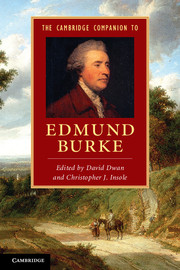Book contents
- Frontmatter
- Contents
- Contributors
- Acknowledgements
- Method of Citation
- Chronology
- Introduction Philosophy in Action
- 1 Burke’s Life
- 2 Burke, Enlightenment and Romanticism
- 3 Burke as Rhetorician and Orator
- 4 Burke’s Aesthetic Psychology
- 5 Burke on Law and Legal Theory
- 6 Burke on Political Economy
- 7 Burke and Religion
- 8 Burke and the Constitution
- 9 Burke and the Natural Law
- 10 Burke and Utility
- 11 Burke and the Ends of Empire
- 12 Burke and the American Crisis
- 13 Burke on India
- 14 Burke and Ireland
- 15 Reflections on the Revolution in France
- 16 Burke’s Counter-Revolutionary Writings
- 17 Burke in the United States
- Further Reading
- Index
- References
7 - Burke and Religion
Published online by Cambridge University Press: 05 December 2012
- Frontmatter
- Contents
- Contributors
- Acknowledgements
- Method of Citation
- Chronology
- Introduction Philosophy in Action
- 1 Burke’s Life
- 2 Burke, Enlightenment and Romanticism
- 3 Burke as Rhetorician and Orator
- 4 Burke’s Aesthetic Psychology
- 5 Burke on Law and Legal Theory
- 6 Burke on Political Economy
- 7 Burke and Religion
- 8 Burke and the Constitution
- 9 Burke and the Natural Law
- 10 Burke and Utility
- 11 Burke and the Ends of Empire
- 12 Burke and the American Crisis
- 13 Burke on India
- 14 Burke and Ireland
- 15 Reflections on the Revolution in France
- 16 Burke’s Counter-Revolutionary Writings
- 17 Burke in the United States
- Further Reading
- Index
- References
Summary
Edmund Burke was not a theologian, but a man of letters and a statesman: it was in these capacities that he was deeply interested in Christianity and its importance for society. He did not conceive religion as an activity of body or mind insulated from the rest of life and thought, but rather as a relation between God and people which, in a range of ways, characterised central aspects of their terrestrial lives as well as their eventual destiny. It will be best to turn to specifics in order to understand what Burke had in view.
Early Thought
Burke was educated – whether at home or Ballitore School or Trinity College, Dublin – at places where the truth of Christianity was assumed. By the time he left Trinity, he had an orientation towards religion, improvement, and politics. Ireland at that date was a place where reflective thinking had its main social setting in a small educational elite, much of it connected with the Church of Ireland. This elite contemplated a political class that owned much of the land, and consisted primarily of a gentry and peerage, headed by the king’s representative, the lord-lieutenant, but this elite saw too a tiny professional class, and a huge, illiterate, impoverished peasantry. The aim of the educational elite, which it shared with some of the political class, was improvement in the broadest sense, that is to say it connected self-improvement, via the arts and sciences and through the development of intellectual skills, with moral culture and with economic development. The Irish situation suggested a general rationale of practice to those who wished to improve themselves and others: improvement, if it was to spread outside the educational elite, must spring from the guidance and good will of the possessing classes – from the landlord who developed his property, from the priest who instructed and consoled the poor, and from the lord-lieutenant who used his power benevolently. In other words, direction was from above, and it needed to be given in an easily intelligible form.
- Type
- Chapter
- Information
- The Cambridge Companion to Edmund Burke , pp. 92 - 103Publisher: Cambridge University PressPrint publication year: 2012
References
- 5
- Cited by

